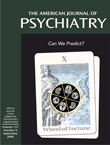Attention, Memory, and Motor Skills as Childhood Predictors of Schizophrenia-Related Psychoses: The New York High-Risk Project
Abstract
OBJECTIVE: Childhood neurobehavioral deficits in offspring of schizophrenic, affectively ill, and psychiatrically normal parents were evaluated as predictors of schizophrenia-related psychoses in adulthood. METHOD: The offspring were tested with neurobehavioral measures at 7–12 years of age and assessed in mid-adulthood for axis I diagnoses. The relationships of childhood deficits in attention, verbal memory, and gross motor skills to adulthood schizophrenia-related psychoses were examined in separate path analyses by using logistic regression equations. Sensitivity and specificity were determined for each of the childhood dysfunctions. RESULTS: For the offspring of schizophrenic parents, childhood deficits in verbal memory, gross motor skills, and attention identified 83%, 75%, and 58%, respectively, of the subjects with schizophrenia-related psychoses; 50% were identified by all three variables combined. False positive rates in subjects who did not develop schizophrenia-related psychoses ranged from 18% for those with deficits in attention during childhood to 28% for those with deficits in memory. The three variables had low deficit rates in the offspring of the other two parental groups and were not associated with other psychiatric disorders in any group. CONCLUSIONS: Schizophrenia-related psychoses in adulthood are distinguished in subjects at risk for schizophrenia by childhood deficits in verbal memory, gross motor skills, and attention. The findings suggest that deficits in these variables are relatively specific to schizophrenia risk and may be indicators of the genetic liability to schizophrenia.



